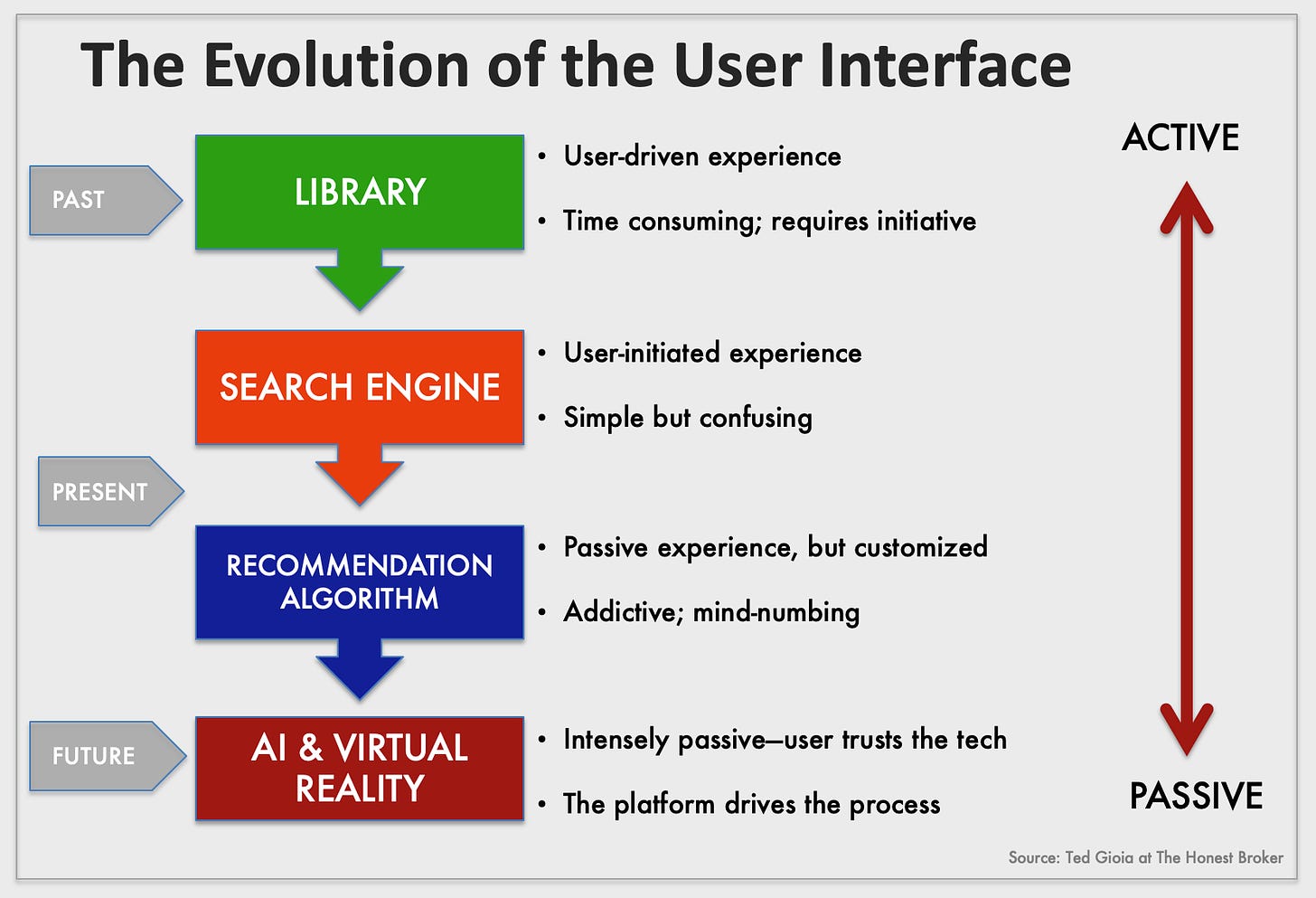What algorithms did to the content experience
Consuming, creating and engaging got bundled. Consuming became mindless. Creating became ostentatious. Engaging became a social expectation.
I've been thinking about why I find it hard to disconnect from my devices. Algorithms changed our relationship with content. Consuming, creating and engaging got bundled and became driven by a vicious cycle of bad incentives. Consuming became mindless. Creating became ostentatious. Engaging became a social expectation.
Algorithms tied everything together, but we may be at an inflection point. There's a general recognition the current experience isn't great. Can we think about each part of that cycle differently?
Consuming
I subscribe to a bunch of newsletters because I want to be more intentional with what I read. But the world of recommendation algorithms doesn't lend itself to being focussed or intentional. I still scroll through Instagram Reels.
This graphic by Ted Gioia wonderfully shows how the evolution in UIs also changed what we consume and how we do it.

Gioia suggests the trend of consuming passively will continue with AI. But if LLMs shift us away from multiple content suggestions to a single one, that practically can give us more freed time. The persistence of email newsletters, podcasts and subscription-based news shows there's appetite for consuming content more intentionally.
Creating
Creating content isn't just for influencers. If you post on social media you have to play the game and feed the algorithm. I made a decision a few years ago to no longer post on social media. I'm still there but by having this simple rule it's helped me avoid, as much as possible, the game of more likes, more views. I'm not out of that game though - I picked a somewhat obnoxious title so you'd hopefully read this email.
The Vox article Everyone's a sellout now calls it out:
While Big Tech sites like Spotify claim they’re “democratizing” culture, they instead demand artists engage in double the labor to make a fraction of what they would have made under the old model. That labor amounts to constant self-promotion in the form of cheap trend-following, ever-changing posting strategies, and the nagging feeling that what you are really doing with your time is marketing, not art. Under the tyranny of algorithmic media distribution, artists, authors — anyone whose work concerns itself with what it means to be human — now have to be entrepreneurs, too.
There's even a more insidious version of this. The Cosmopolitan article What’s the Price of a Childhood Turned Into Content? looks at child labor as social media stars:
Now a young adult in her 20s looking back on her childhood, Vanessa says the reality of the blog being the family’s main source of income put an enormous amount of pressure on her. “There was this idea that you have to look perfect and pretty and like nothing is wrong all the time in front of the camera,” she says. “And if it seemed like I wasn’t trying hard enough to maintain that image, like my smile wasn’t as bright as it should be or I didn’t say a line with enough enthusiasm…that would usually devolve into accusing me of not caring about our family. I was told by my mom, ‘Do you want us to starve? Do you want us to not be able to make our payment next month on the mortgage?’”
Tying financial incentives to identity only leads to bad outcomes. That's why influencer culture has peaked with over the top 'stunts' and sensationalism. Polygon's The End of the MrBeast era breaks down this trend and argues it might be over:
Fueled by an obsession with the architecture of his own fame, Donaldson’s process now seems him engineer videos that, while potentially entertaining to humans, do not get uploaded unless they clear a bar set by the YouTube algorithm. In a different context, this calculated approach to videos might raise questions about the value and meaning of his art. Except MrBeast’s brand of hustle culture has become a de facto part of YouTube’s dominant aesthetic.
The article argues that the internet now is "hungry for authenticity". There's an inherent recognition that what we have now isn't right. As long as creating is so closely tied to views and reach in the content ecosystem we'll only get "authenticity" and not authenticity.
The trend toward open source social networks may mean creating may not be shaped by just one or two Main Algorithms, so everything doesn't need to end up looking and feeling the same.
Engaging
Choosing not to engage online feels like choosing not to engage with society. It's a lose-lose situation. That's why it feels as if the only way to date is using dating apps, finding people with similar interests means posting on Reddit, and staying connect with friends means sharing a meme. Each of those are not inherently bad, but when the incentives that come with recommendation algorithms are so closely connected, they start to become worse experiences for all of us.
I've shared articles by Jonathan Haidt before, and his most recent one, End the phone-based childhood now describes this problem:
Social media is all about network effects. Most students are only on it because everyone else is too. Most of them would prefer that nobody be on these platforms. Later in the study, students were asked directly, “Would you prefer to live in a world without Instagram [or TikTok]?” A majority of students said yes––58 percent for each app.
This is the textbook definition of what social scientists call a collective-action problem. It’s what happens when a group would be better off if everyone in the group took a particular action, but each actor is deterred from acting, because unless the others do the same, the personal cost outweighs the benefit.
From the same article, Haidt's captures something I've felt but struggled to articulate – why digital relationships feel different.
Real-world interactions usually take place within communities that have a high bar for entry and exit, so people are strongly motivated to invest in relationships and repair rifts when they happen. But in many virtual networks, people can easily block others or quit when they are displeased. Relationships within such networks are usually more disposable.
There's a reason group chats have become a thing. The New York Times even wrote about it. There's clearly a desire for something different.
So, what next
It feels like there's a recognition for something different in the cultural zeitgeist. And we're seeing a shift in both search and social media. Why does that matter? There's an opportunity for new content formats and new user interfaces. That unlock opportunities for new business models, and with it the potential to unbundle the experience of consuming, creating and engaging.
💩 Cool shit
News Map – Google News, visualized.
Title Drops – A fun way to explore when characters say the title of the movie they're in.
Is Super Mario Maker Beaten – I love this. Super Mario Maker let users create their own levels. This site is tracking a quest to beat all of them, and they've been stuck with 1 left for a little while now.
Parliamentary Debates in Casual Tone – This is so dumb, but fantastic. UK Parliament discussions translated into text messages.
Coffee Receipt Stories – A collection of illustrations on the back of receipts, on a wonderfully delightful website.
Design Engineers – This is an article about a somewhat obscure job title, but it also has a collection of some wonderful little UI interactions.
XOXO Fest – I spent way too long on this site after it was shared with me. I know nothing about the festival, but play with the toggle switch.
88x31 Archive – It's a collection of 88x31 pixel buttons from the days of GeoCities. Enjoy.
Share this with a friend so you Don't Let PayPal's Best Offer Slip Through Your Fingers!

